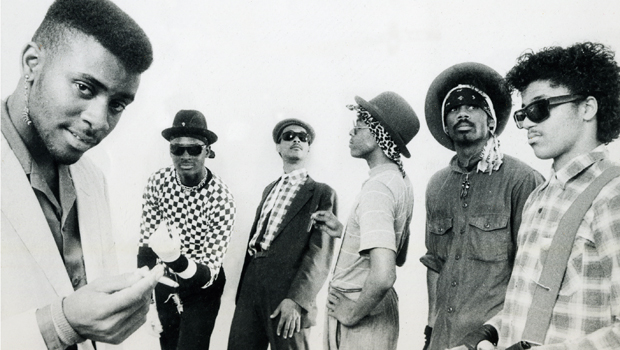Interview: Norwood Fisher Discusses the New Fishbone Documentary, 'Everyday Sunshine: The Story of Fishbone'

Every so often, a band bursts onto the scene like the perfect storm. When conditions are right, lives will forever be changed and said band will — pardon the expression — fuck your shit up.
This is what happened when Fishbone hit the scene during the early 1980s. Equipped with an arsenal of influences ranging from punk music to soul and funk, six black teenagers from Los Angeles (Angelo Moore, Norwood Fisher, Phillip “Fish” Fisher, Chris Dowd, Walter Kibby II and Kendall Jones) would carve a niche for themselves within the largely homogenized world of rock.
What’s more, they ultimately paved the way for a future generation of musicians such as the Roots and TV on the Radio to pick up guitars and explore their own individuality.
Fishbone’s unique rise to success gets its overdue Hollywood treatment with the documentary, Everyday Sunshine: The Story of Fishbone. Filmmakers Lev Anderson and Chris Metzler craft an engaging, humorous and deftly honest look at the pioneering rock group — complete with animation, archival footage and celebrity interviews (among the contributors is Flea, Gwen Stefani and Perry Farrell; actor Laurence Fishburne narrates.).
Although many people would jump at the chance to see their lives play out on the big screen, [Norwood] Fisher’s initial reaction to the idea of a film was tepid.
“Actually, I wasn’t gung-ho when [the directors] came to us,” he says. “I thought, ‘Once you tell your story, you eventually have to put a period at the end of it.’”
Instead, what results is the kind of cinematic gold that embeds itself into the hearts and souls of music fans and leaves them wanting more. Everyday Sunshine journeys back to the late 1970s with the initial meeting of the group’s founding members. From there, it takes the viewer on a nostalgic look at the cultural lexicon, interwoven with Fishbone’s internal and external struggles.
Get The Pick Newsletter
All the latest guitar news, interviews, lessons, reviews, deals and more, direct to your inbox!
Career highlights are also proudly displayed: everything from music video collaborations with Spike Lee to an appearance on Saturday Night Live. However, Fisher still admits to being taken aback by what he saw during his initial screening of the documentary.
“It was kind of like going to school and forgetting you didn’t have pants on,” he jokes. “Not that it was bad, but we really let it hang out — as honest as we could with cameras rolling.”
In one such surprising revelation, Anderson and Metzler juxtapose footage of a packed Fishbone performance from the 1990s with a modest present day in-store at a Torrance, California, retail outlet. The band can even be heard joking about the size of the turnout, revealing that Fishbone has learned to take fickle musical tastes in stride.
“I look at it like everybody’s career goes on a curve. We’re just going to ride this curve as gracefully as possible. There are a lot of obstacles out there for a band like Fishbone. In a way, we were our own obstacle,” notes Fisher.
Trials faced by the group have included several changes in lineup. Moore and [Norwood] Fisher are the only two founding members remaining. Guitarist Rocky George (formerly of Suicidal Tendencies) joined Fishbone in 2004 and found the documentary to be incredibly informative about the band’s years prior to his affiliation with it.
“You know what? I’ve seen it in bits and pieces but it’s very interesting. It was very enlightening for me — not being an original member — getting all this insight.”
Fishbone has even been extremely proactive about supporting the next generation of black rockers and afro punks as Fisher explains:
“In a general sense, we feel a camaraderie with them. We more than wish them well. We try to work with other bands. It’s kind of hard, though, when you’re working with management.”
He goes on to drop the news that Fishbone has reached out to Bad Brains and Living Colour in hopes of hitting the road with both acts sometime in the near future. While no plans have been set in stone, the environment is ripe with possibility.
Until then, Everyday Sunshine: The Story of Fishbone should continue to expose these venerable rockers to a new fan base while reconnecting them with the audience they amassed so many years ago. Their signature sound and incendiary stage shows also afford Fishbone the chance to pay homage to guitar heroes like Larry Graham, Michael Hampton and Jimi Hendrix.
Fisher waxes philosophic about the wild ride he’s been on and everything that life as music pioneer has taught him.
“All I have is appreciation for the road that I’ve traveled and I feel very fortunate that I overcame my approach to life through my music.”
That’s Fishbone for you … revolutionary to the very end.
For more info about Fishbone and the new documentary, visit Fishbone.net.
“The rest of the world didn't know that the world's greatest guitarist was playing a weekend gig at this place in Chelmsford”: The Aristocrats' Bryan Beller recalls the moment he met Guthrie Govan and formed a new kind of supergroup
Carlos Santana hospitalized following pre-show medical emergency


![[from left] George Harrison with his Gretsch Country Gentleman, Norman Harris of Norman's Rare Guitars holds a gold-top Les Paul, John Fogerty with his legendary 1969 Rickenbacker](https://cdn.mos.cms.futurecdn.net/TuH3nuhn9etqjdn5sy4ntW.jpg)







